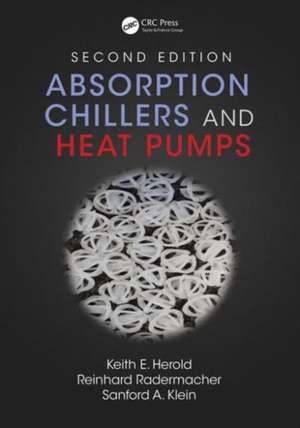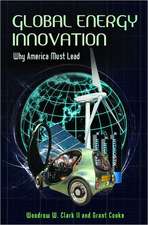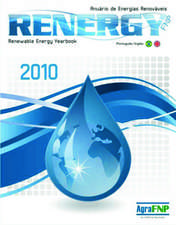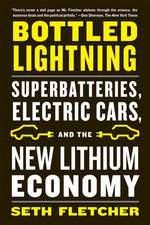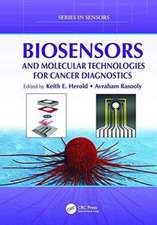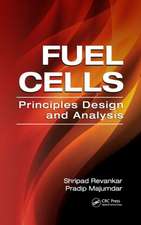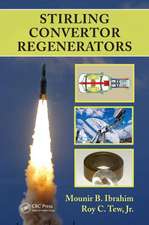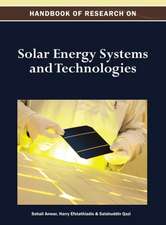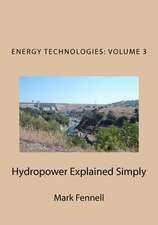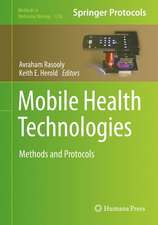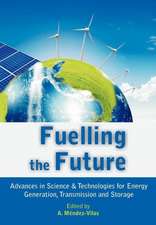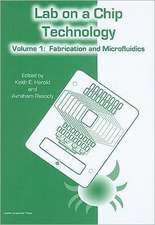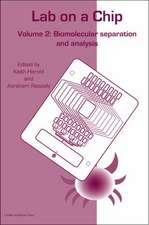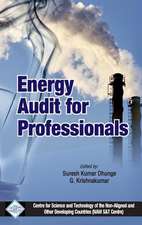Absorption Chillers and Heat Pumps
Autor Keith E. Herold, Reinhard Radermacher, Sanford A. Kleinen Limba Engleză Hardback – 4 apr 2016
New to the Second Edition:
- Offers details on the ground-breaking Vapor Surfactant theory of mass transfer enhancement
- Presents extensively revised computer examples based on the latest version of EES (Engineering Equation Solver) software, including enhanced consistency and internal documentation
- Contains new LiBr/H2O property routines covering a broad range of temperature and the full range of concentration
- Utilizes new NH3/H2O helper functions in EES which significantly enhance ease of use
- Adds a new chapter on absorption technology applications
- Offers updated absorption fluid transport property information
Preț: 1286.78 lei
Preț vechi: 1569.24 lei
-18% Nou
Puncte Express: 1930
Preț estimativ în valută:
246.22€ • 257.77$ • 203.73£
246.22€ • 257.77$ • 203.73£
Carte tipărită la comandă
Livrare economică 07-21 aprilie
Preluare comenzi: 021 569.72.76
Specificații
ISBN-13: 9781498714341
ISBN-10: 149871434X
Pagini: 392
Ilustrații: 190 black & white illustrations, 63 black & white tables
Dimensiuni: 178 x 254 x 28 mm
Greutate: 0.86 kg
Ediția:Revised
Editura: CRC Press
Colecția CRC Press
ISBN-10: 149871434X
Pagini: 392
Ilustrații: 190 black & white illustrations, 63 black & white tables
Dimensiuni: 178 x 254 x 28 mm
Greutate: 0.86 kg
Ediția:Revised
Editura: CRC Press
Colecția CRC Press
Public țintă
Professional Practice & DevelopmentCuprins
Introduction. Absorption Cycle Fundamentals. Properties of Working Fluids. Thermodynamic Processes with Mixtures. Overview of Water/Lithium Bromide Technology. Single-Effect Water/Lithium Bromide Systems. Double-Effect Water/Lithium Bromide Technology. Advanced Water/Lithium Bromide Cycles. Single-Stage Ammonia/Water Systems. Two-Stage Ammonia/Water Systems. Generator/Absorber Heat Exchange Cycles. Diffusion–Absorption Cycle. Applications of Absorption Chillers and Heat Pumps. Appendices. References.
Notă biografică
Keith E. Herold started working in absorption refrigeration during his PhD studies at The Ohio State University, Columbus. This research focus was motivated by his work at Battelle Memorial Institute, Columbus, Ohio, where he was involved in building and running custom absorption refrigeration cycles under contract to the US Department of Energy, among others. Subsequent to those experiences, he joined the University of Maryland, College Park, where he was the director of the Sorption Systems Consortium, which was funded by various companies. Dr. Herold has authored approximately 50 publications on the subject of absorption refrigeration and his group developed the vapor surfactant theory of mass transfer enhancement.
Reinhard Radermacher holds a diploma and PhD in physics from the Technical University of Munich, Germany, and conducts research in heat transfer and working fluids for energy conversion systems—in particular, heat pumps, air conditioners, refrigeration systems, and integrated cooling heating and power systems. His work resulted in nearly 400 publications, as well as numerous invention records and patents. He has coauthored three books on absorption and vapor compression heat pumps. His research includes the development of software for the design and optimization of heat pumps and air conditioners, which is now in use at more than 60 companies worldwide.
Sanford A. Klein is an Emeritus Professor of mechanical engineering at the University of Wisconsin–Madison. He received his PhD in chemical engineering at the University of Wisconsin–Madison in 1976, and has been a faculty member since 1977. He is the author or coauthor of more than 160 publications relating to energy systems. Professor Klein’s current research interests are in thermodynamics, refrigeration, and solar energy applications. In addition, he has been actively involved in the development of engineering computer tools for both instruction and research and the author of the EES program.
Reinhard Radermacher holds a diploma and PhD in physics from the Technical University of Munich, Germany, and conducts research in heat transfer and working fluids for energy conversion systems—in particular, heat pumps, air conditioners, refrigeration systems, and integrated cooling heating and power systems. His work resulted in nearly 400 publications, as well as numerous invention records and patents. He has coauthored three books on absorption and vapor compression heat pumps. His research includes the development of software for the design and optimization of heat pumps and air conditioners, which is now in use at more than 60 companies worldwide.
Sanford A. Klein is an Emeritus Professor of mechanical engineering at the University of Wisconsin–Madison. He received his PhD in chemical engineering at the University of Wisconsin–Madison in 1976, and has been a faculty member since 1977. He is the author or coauthor of more than 160 publications relating to energy systems. Professor Klein’s current research interests are in thermodynamics, refrigeration, and solar energy applications. In addition, he has been actively involved in the development of engineering computer tools for both instruction and research and the author of the EES program.
Recenzii
"There are a number of published books on the technologies of refrigeration and heat pump[s] but most of them focus on compression refrigeration/heat pump cycles. To my knowledge, the book Absorption Chillers and Heat Pumps is the most comprehensive in covering all [of] the essential knowledge in the areas of absorption chillers and heat pumps. These include fundamentals, working fluid selections, single and double stage absorption systems, applications and modellings."
—Dr. Yunting Ge, Brunel University London, UK
—Dr. Yunting Ge, Brunel University London, UK
Descriere
This book provides an updated and thorough discussion of the physics and applications of absorption chillers and heat pumps. An in-depth guide to evaluating and simulating absorption systems, this revised edition provides significantly increased consistency and clarity in both the text and the worked examples. The introduction of the Vapor Surfactant theory is a major new component of the book. This definitive work serves as a resource for both the newcomer and seasoned professional in the field.
